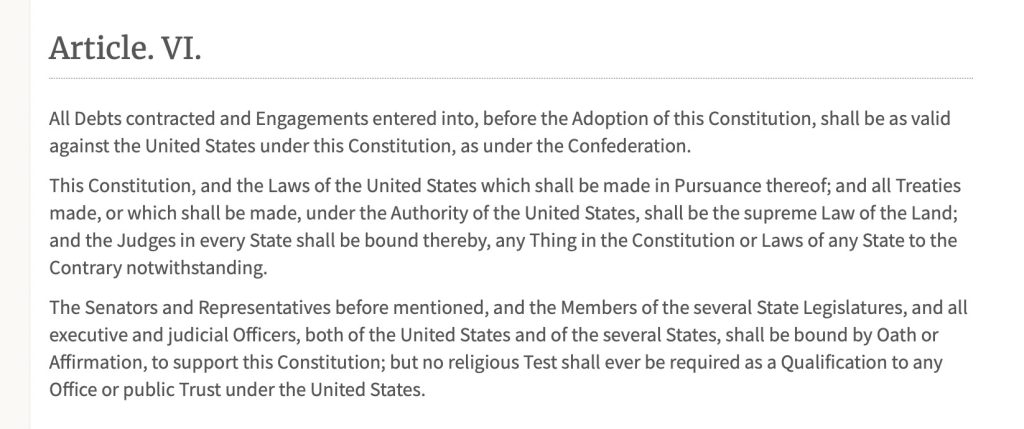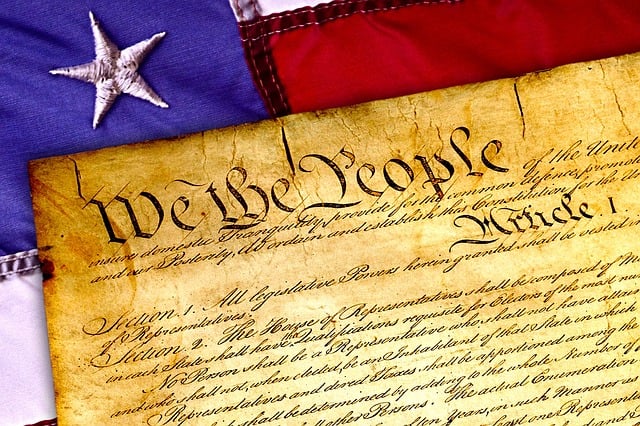Missing the Point – Donald Trump and The Fourteenth Amendment
Hello. It’s 2024, barely. So far, so good.
As you know, former President Trump is running again for President. The question is, does his instigation and support of the January 6, 2021 attack on the Capitol – for the expressed purpose of keeping him in office without regard for the actual results of the 2020 election – disqualify him from running again.
The answer is, yes it does.
I don’t know what all the quibbling is about, so I’m going to address the question… The question of Constitutional disqualification. The media tends to exaggerate problems because anxiety and tension feed its audience. The more pundits you ask about something, the more points of view you’ll hear because, even the best of them needs to differentiate him or herself from all the others. Because being on the air creates notoriety and income. I get it, but all this furor distracts from the basics and can be as disruptive as the confusion which is Trump’s principal strategy.
Shouting innocence, denying the facts, playing the victim are not new concepts. They just don’t have the long-term power of truth in a free society. We’re taught that President Lincoln once observed, “You can fool all the people some of the time and some of the people all the time, but you cannot fool all the people all the time.” Words to that effect. Notwithstanding who said what exactly, it’s a good and relevant point.
Let’s start by reading the actual text of Section 3 of the Fourteenth Amendment which is the language all this hullabaloo is about…

It’s brief and to the point, but I’ll make it even shorter to focus attention on the keywords…
No person shall… hold any office… under the United States… who, having previously taken an oath… to support the Constitution of the United States, … shall have engaged in insurrection…
The italics and bolding are mine.
Question 1. Does it pertain to the President of the United States even though the word “President” is nowhere mentioned?
Answer. Of course, it does. Note the phrase “hold any office” and let’s defer to the first paragraph of Article II, Section 1 of the Constitution.

“He <the President>,” the Constitution tells us, “shall hold his Office…” Clearly, the Constitution views the President as being an “office holder. Nowhere in the Fourteenth Amendment, Section 3 itself, or anywhere else in the Constitution, is the Office of President exempted from this restriction imposed by the Fourteenth Amendment – without Congressional action we’ll discuss later.
Question 2. Does a person need to be formally convicted of insurrection, in a court of law, in order to be disqualified to hold office?
Answer. In this case, the applicable language of Section 3 of the Fourteenth Amendment is “shall have engaged in insurrection.” Again, the bolding is mine.
The authors of our Constitution could have easily – even well before the conveniences of word processing – used the words “been convicted of,” but did not. To assume that’s what they meant to say is a step too far over the line of what passes as legitimate interpretation and modernization of Constitutional language. Interpretation of the Constitution for reasons related to the evolution of language and culture over 250 years is one thing. Changing the meaning of the Constitution for political purposes is another thing altogether and has the effect of nullifying the document’s power as the rule of law.
Question 3. The current legal meaning of “insurrection” is “the act or an instance of revolting especially violently against civil or political authority or against an established government, or the crime of inciting or engaging in such revolt.” Did former President Donald Trump engage in insurrection? And by whose authority do we come to that conclusion with such confidence that we would deny a person the right to hold office?
Answer. One could argue that there is no such acceptable authority to confirm participation in insurrection other than a court of law – and that President Trump, while having been indicted, has not yet been convicted of insurrection. But again, Section 3 makes no mention of the need for any Federal or State legal action to determine whether or not someone “shall have engaged in insurrection.”
What is interesting to note is that Donald Trump’s attorneys apparently agree that he did, in fact, say and do the things we all heard and saw him do relative to the January 6, 2021 attack on the Capitol. What choice do they have but to concede the obvious?
Trump’s attorneys aren’t seriously arguing that he didn’t encourage and support an insurrection. Or that it wasn’t technically an insurrection he was instigating. Their principal defense is that it wasn’t illegal for him to do so. It’s not that he’s innocent per se, but that, legally speaking, he’s bulletproof. He’s untouchable because he was President of the United States at the time of the insurrection and therefore above all law pertaining to everyone else but him. For the record, that’s a singular exception we do not allow
What is the source of the oft-quoted point that no one is above the law? Well, the Constitution of course. Here, in the screenshot below, is Article VI in its entirety. Its point, as you can read in the second paragraph, is that the Constitution is “the supreme Law of the Land.” There are no exceptions. Read, in the third paragraph, the phrase, “…and all executive and judicial Officers.” Again, no exceptions. No one, in other words, is above the law. The thing about being a nation of laws, about our being a free country, is that it only works if there are no exceptions.

So, is that it for “The Donald”? Can enough states successfully, sustainably agree to remove him from their ballots to effectively rule out an Electoral College victory? No. Regrettably, there’s hope for his candidacy yet.
For one thing, the Supreme Court could go off the deep end and reinterpret the Constitution subject to the political agendas of the former President. Good news for we, the people. That’s not going to happen. The combined weight of tradition, common sense and legacy is far too great.
And then there is that last sentence in Section 3 of the Fourteenth Amendment… “But Congress may by a vote of two-thirds of each House, remove such disability.” With power so evenly split in both Houses, this option would be a very long shot at best.
Last but not least, there’s a technical question the Constitution doesn’t resolve. Section 3 of the Fourteenth Amendment disqualifies an insurrectionist from holding office, but says nothing about his or her about running for that office. …Can a state prevent someone from being on a ballot for a party primary election? From running to be a party’s nominee on the grounds of Fourteenth Amendment disqualification? Or do they need to wait for the general election? If not by taking a disqualified candidate’s name off the ballot, how else can a state enforce Section 3 of the Fourteenth Amendment?
Whether it’s the primary or general election ballot we’re talking about, either way, I don’t think it makes any difference as long as the states employ some reasonable, Constitutionally acceptable process for determining Trump’s involvement in a bona fide act of insurrection. And their ability to do just that should be all that matters.

Les Cohen is a long-term Marylander, having grown up in Annapolis. Professionally, he writes and edits materials for business and political clients from his base of operations in Columbia, Maryland. He has a Ph.D. in Urban and Regional Economics. Leave a comment or feel free to send him an email to [email protected].

